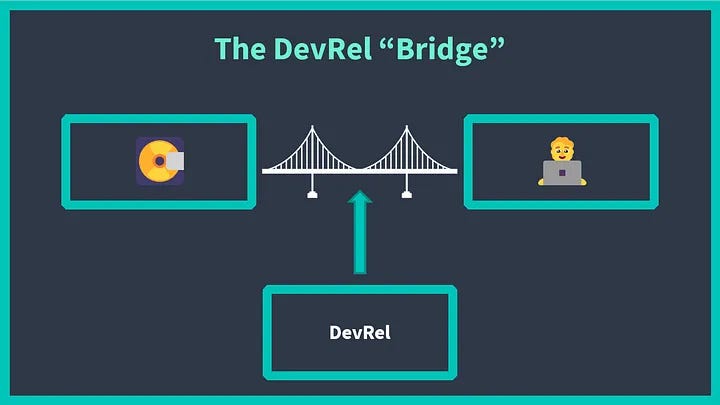While this is a frequent discussion I have had with people in the tech community over my last two years as a Developer Relations (DevRel) professional, one of the most common questions I still receive is what DevRel is. While I may have had a massive number of conversations about this, truth be told, the number of people asking the question has only increased. Therefore, in the issue, we’ll revise and understand what DevRel is and the difference it makes for a company.
Defining DevRel 🥑
To understand what DevRel is, we must first understand what led to the development of this domain in the first place. Over the last 15-20 years, our world has seen rapid growth in the development and adoption of new technologies. We, as a society, are both consuming and building new tech. Of course, as we started making new technologies, we saw an increase in the tools used to build these. These tools include new databases, storage services, programming languages, cloud platforms, etc. The companies behind these tools can often be classified into the following:
Developer First: These companies cater products primarily to developers (B2D). Examples include Twilio, Auth0, MongoDB, Appwrite, etc.
Developer Plus: These companies cater products primarily to businesses (B2B) or consumers (B2C) and secondarily to developers to leverage their platforms to build. Examples include Microsoft, Twitter, Amazon, Salesforce, etc.
With more and more organizations catering their services to developers, it became apparent that they need people who can build with their platforms, empathize and communicate with developers, educate newcomers, grow their audience, etc. DevRel aims to fit this gap precisely.
Therefore, if we must define DevRel,
Developer Relations, or DevRel, is a domain that focuses on maintaining relationships with the folks building on an organization's technologies or products.
DevRel acts as the bridge between the code and the community. DevRel folks are often responsible for maintaining communication between organizations and developers to ensure a better information flow and feedback loop. Thus, both entities have a better experience and growth path.
Different Roles Under The DevRel Umbrella ☂️
DevRel is not a single role but a grander umbrella comprising various facets that are essential to the growth of both the developer and the product:
Developer Advocacy
Developer advocates propagate the developers’ voice with a particular product to the concerned organization. They are responsible for ensuring product understanding and assisting with education and outreach initiatives while maintaining regular feedback flows for the organization.
Community Management
Community managers ensure that the developer community of an organization maintains active engagement and remains a safe space for all while planning and executing initiatives that facilitate the growth of the organization’s audience and community.
Developer Education
Developer educators enable developers to understand a product better and learn how it functions to start building with the organization’s product as quickly as possible through curated learning content/curriculum, video or written content, community initiatives, etc.
Technical Writers
Technical writers focus on creating technical content, such as blogs and documentation, to help with product education, build awareness, enable better SEO for the brand, etc.
Developer Marketing
Developer Marketers aim to catch the attention of developers to drive awareness and adoption around a product, ensuring that an organization’s audience does not stop growing.
What Experience Should DevRel Practitioners Possess 💼
Considering that DevRel can be viewed as an amalgam of code, content, and community, most roles in this space need you to be a jack of all three trades while being a master of (at least) one. My experience has taught me that, while there is always space to learn, as a DevRel practitioner (for example, Developer Advocate), you should gain knowledge on all three fronts, and here is why:
Writing Code
You can only really understand the pros and cons of the product you advocate for from a technical standpoint if you know how it runs under the hood. Which means you need to be a developer and a technologist first. This will also allow you to build a better sense of developer empathy for your community members. Additionally, being able to code will allow you to experience the developer experience of your product and offer feedback to your engineers, which enables better product development.
Creating Content
One key factor for any successful DevRel team is communicating with the brand and product’s audience; content enables that in the best way possible. It allows you to educate and advocate for your product more accurately and increases your likability and relatability, which also benefits your personal and organization’s brands. Therefore, being able to create and deliver content (written, audio, or video) is a skill that DevRel practitioners must develop.
Building Communities
Community building experience has some massive advantages because it allows you to learn how to manage the execution of initiatives, collaborate with external stakeholders, build an audience, sustain engagement, and maintain brand growth, all in one single package. Being a DevRel professional, you are contributing to the business at the end of the day. Aside from learning how to work with larger groups of people, building communities teaches you how to evaluate the impact you can have on the growth of an organization.
Further Reading 📃
Of course, this is a start to understanding what DevRel teams do. I will soon follow up with more content about my work in DevRel. Until then, here is some further reading I recommend:







